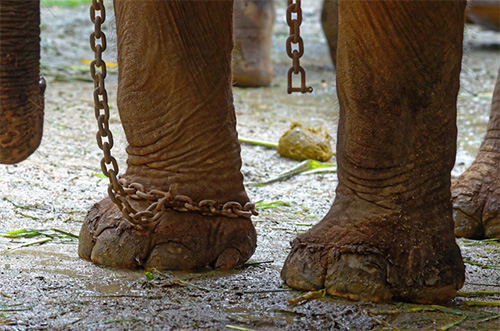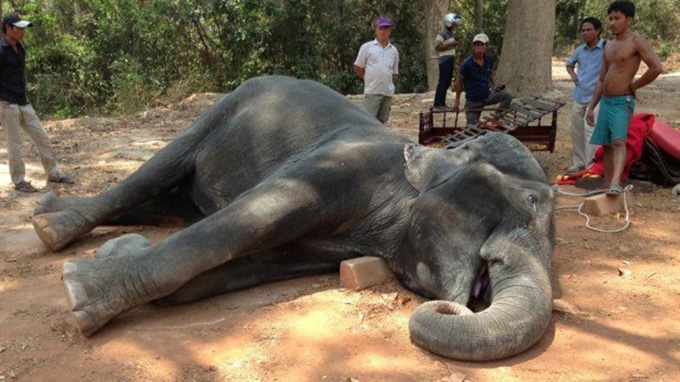A clip of elephant riding in Thailand where performances are most common and where animal cruelty regulations are regarded as weak. Video: World Animal Protection
As global response to an online petition continues to grow, can the death of one elephant change attitudes on Southeast Asia’s animal tourism industry? Dominic Pink investigates for Asia Pacific Report.
More than 150,000 people have signed a petition to end elephant riding at Angkor in Cambodia, a UNESCO World Heritage site where tourists converge to marvel at the immense Khmer Empire ruins.
“There is no such thing as cruelty-free elephant rides,” says the Change.org petition, which asks that APSARA (Authority for the Protection and Management of Angkor and the Region of Siem Reap) ban elephant riding at the archaeological park.
![]() The catalyst was the death last month of Sambo, a female elephant aged between 40 and 45, who collapsed and died of a presumed heart attack after carrying tourists between temples in oppressively hot temperatures — nearby Siem Reap recorded a high of 40 degrees C on April 22.
The catalyst was the death last month of Sambo, a female elephant aged between 40 and 45, who collapsed and died of a presumed heart attack after carrying tourists between temples in oppressively hot temperatures — nearby Siem Reap recorded a high of 40 degrees C on April 22.
Cambodia has just 70 captive and 500 wild elephants remaining, according to Jack Highwood, founder of the Mondulkiri-based NGO Elephant Valley Project, “so to lose another is a sad loss for Cambodia’s increasingly rare elephant population.”
The World Wildlife Fund lists Asian elephants as an endangered species, with the total population estimated somewhere between 30,000 to 50,000 and on the decline.
“Cambodia owes much of its rich history to the strength of the elephant,” says Highwood.
“Now that Cambodia is prospering, it should take advantage of its new-found wealth to protect this important species.”
International support
International animal welfare organisations such as the Elephant Asia Rescue and Survival Foundation (EARS) and World Animal Protection (WAP) have voiced their support for the petition, and are challenging travel companies to get on board.
“It has been really heartwarming to see the global response to Sambo’s death,” says Carmel de Bedin, EARS Asia’s Hong Kong director.
“There has been incredible support for the petition, both locally and internationally, and we feel that this is really indicative of the changing attitudes around the world to elephant tourism.”
Nicola Beynon, head of campaigns for WAP Australia and New Zealand, says their research has found that when people are made aware of the cruelty involved in wildlife attractions such as elephant rides, “they consider it unacceptable.”
“The problem is that a lot of the cruelty is hidden and goes on behind the scenes,” she says.

“For instance, most people wouldn’t know that elephants go through a process called ‘the crush’ … When they are young, they get taken from their mothers, kept in isolation, chained up, deprived of food, and beaten.
“It’s a horrific process, designed to break the elephant’s spirit so that it submits to human will and is safe to interact with tourists. And that’s just the start of their life in captivity.”
Decreasing demand
WAP are focussed on decreasing tourist demand for exploitative wildlife attractions, and more than 100 travel companies have committed to their pledge to no longer sell elephant rides in packages, including Contiki, Intrepid Travel and World Expedition.
The organisation is now taking aim at TripAdvisor with a petition that accuses the popular online travel company of profiting from animal cruelty, and demands that they stop promoting and selling tickets — through their subsidiary Viator — to “cruel wildlife tourist attractions”.
This strategy proved successful earlier this year when travel company Thomas Cook removed sales of elephant rides and shows following a WAP petition signed by almost 175,000 people.
According to the WAP petition, the University of Oxford reviewed 188 wildlife venues featured on TripAdvisor last year and found that 75 percent of the attractions involved wildlife cruelty.
“We’re targeting TripAdvisor because they are the biggest online travel company and they are hugely influential in terms of how tourists spend their dollars,” says Beynon.
“If TripAdvisor came on board with this campaign they could be a tremendous force for good.”
WAP is asking TripAdvisor to put in place a “positive programme” called “Wildlife Leaders”, inspired by their existing eco-friendly programme “Green Leaders”, where venues that treat animals responsibly would be rewarded.
TripAdvisor Inc. representatives declined to be interviewed for this article, responding to Asia Pacific Report’s request with a statement saying:
“We believe these petitions are well-intentioned and we appreciate their ability to shine a bright light on animal cruelty.
“We believe, however, that these efforts would be better served directed at national governments and local regulatory bodies to ensure that businesses are operating within the legal requirements of that country or region, or better yet, to improve local standards and regulation regarding animal welfare.”
The statement also highlighed that establishments listed on TripAdvisor did not represent their endorsement, and all tickets sold through Viator were subject to a Code of Conduct ensuring that no animal-related experiences that were known to be prohibited by respective governments were offered.
But Beynon believes that this response is “passing the buck”.
“Just because it’s legal, that doesn’t mean it’s not cruel, and big global companies have a responsibility to set their own standards and their own ethics about what they consider acceptable.”
De Bedin concurs, saying TripAdvisor has a “moral duty” when it comes to the sites they choose to promote.
“Suggesting that organisations work directly with the governments is side-stepping the issue and is derogatory to the work of organisations such as EARS Asia, who already do challenge the bodies ‘in charge’ as it were.”
When it comes to advice for prospective Southeast Asia tourists, de Bedin says: “Don’t leave your morals at home.”
Suffering cruelty
“Our rule of thumb,” says Beynon, “If you can hug it, if you can ride it, if you can take a selfie with it, or if it’s performing for you, then there is a very good chance that that animal has suffered cruelty and you should avoid it.”
De Bedin points out that while elephant riding is a growing industry in Southeast Asia, so is ethical elephant tourism.
Last week saw the announcement of a new Elephant Nature Park in Phuket, the second elephant rescue and rehabilitation centre under this banner — considered to be one of the most reputable sanctuaries in Thailand — and the first in collaboration with EARS Asia.
Asia Pacific Report asked the APSARA Authority, the Cambodian Ministry of Tourism, and the Royal Embassy of Cambodia in Canberra for comment, all of whom were unresponsive.
All these more ethical developments have come too late for Angkor’s Samba.
Dominic Pink is an Auckland-based student journalist reporting on AUT’s Asia-Pacific Journalism course.













































“strength” of the elephant? Then why do these degenerate people treat these animals like garbage? The elephants are their livelihood yet they can’t take it upon themselves to respect and love the animal? The West is no different. Look at what is done to cow, pigs, chickens, etc. in the name of “food” for the Westerners fat bloated gut. This world of nothing but cruelty, money money money, and me me me attitude is tiring and despicable. It’s amazing how shitty animals on this planet are treated yet there isn’t one country in this world where animals are not looked at as livelihood and a means to make money… and STILL people can’t find reason to treat them well. These dumb people riding the elephants – you idiot tourists – I hope you fall off and break your face. When I was in Thailand I did not sign up for an trek involving elephants and I met many tourists who couldn’t wait to exploit these animals – I could talk until I was blue – these idiot tourists just looked at me dumb blank faces wondering why I take issue with abusing elephants and why they should not be used as entertainment.
Comments are closed.